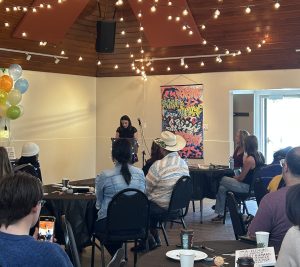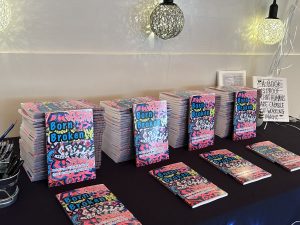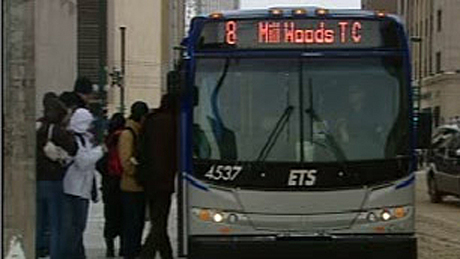Ever wonder what kind of impact your donated goods make on your community? Documentaries like Minimalism: Less is Now and The True Cost highlighted a few problematic practices from some organizations that rely on clothing donations. There can be an immense impact on the environment from discarded clothing and goods.
Bissell Centre takes a more social and environmentally ethical approach to donated goods. Environmental justice and social justice go hand-in-hand – those experiencing houselessness see the most adverse effects as a result of climate change. Just look at our community’s frost bite concerns over the winter and the heat warning over the summer.
Every donation we accept helps us work towards our mission of eliminating poverty in Edmonton. Goods we receive go one of three places: our Family Supports team, our Community Closet, and our two Thrift Shops.
Family Supports
This program sees support workers helping families navigate their way out of poverty. This can include help with childcare and early childhood development, finding permanent housing, and other essentials that help people live with dignity.
Donations to Family Supports provide families with fresh clothing plus home goods to help them settle into their new homes. Home goods can include small appliances, utensils, dishware, and even storage containers.
Community Closet
Nestled in our Community Space, the Community Closet is where individuals experiencing poverty can go for a fresh set of clothes. Many of our community members go weeks or months without changing their clothes. Bacteria can fester in clothing worn for too long, leading to easily preventable fatal infections and diseases.
We supply folks with everything they need to feel more comfortable and confident – pants, shirts, jackets, shoes, and even underwear! In addition, we also offer free laundry services to our community members to ensure that the clothes they have remain clean and comfortable.

Bissell Thrift Shops
We have two locations for our Thrift Shops – Alberta Avenue (8818 118 Ave) in North Central Edmonton and Hermitage (12769 50 St.) in the North East. We also have an online store, an Etsy page, and an active Instagram account showcasing some of the coolest finds donated to Bissell Centre.
But it’s not only about treasure hunting and cool finds. A lot of people in these lower-income neighbourhoods rely on thrift shops for everything from clothes to bedding and even homewares. Plus, 89 cents from every dollar from the Thrift Shops goes back into our life-changing programs. This means you can thrift for a good cause – watch every dollar you give to the thrift store go right back into the community and to the people who need it most.
Individuals connected to our Fetal Alcohol Spectrum of Services (FASS) program contributed to a book about the challenges and realities of navigating life with Fetal Alcohol Spectrum Disorder (FASD). Under the guidance of Jared Epp, Carleton University PhD candidate and former housing support worker with Bissell Centre, who facilitated the group in sharing stories of what was most important to them. Fifteen people shared their stories, captured in this captivating collection. Born Broken is a book that’s an immersive experience into what it means to have FASD and the barriers it can create.

The group celebrated the release of this Born Broken book this past month with a small and intimate reading and sharing. Everyone who contributed to the book received a copy, and a few were shared around the community to help spread its positive message.
Copies of Born Broken books are available to purchase from the Bissell Thrift Shop on 118 Avenue or Paper Birch Books at 10825 95 Street.
Below is the preface to the book, written by Jared Epp. This firsthand experience of seeing the collection come together illuminated the importance of this book for the contributors and for those about to read it and gain a better understanding of FASD.

Preface from Born Broken
A group of individuals connected to Bissell Centre’s Fetal Alcohol Spectrum of Services (FASS) came together for a book project. The goal was to provide an opportunity for folks to share whatever kind of content they wanted. Leaving it open-ended allowed the individuals participating in the project to share what was meaningful to them. Their contributions didn’t have to only be about living with Fetal Alcohol Spectrum Disorder (FASD). A number of contributors did want to share their stories about living with FAD, about their daily challenges, as well as the impact of receiving their diagnosis. Others talked about different things. There are stories about adventure on Edmonton’s public transit, sewing denim, dreaming, making music and art, the challenges of finding and keeping a job and many other events and situations the reader will soon encounter.
Woven throughout the book are stories, ideas, frustrations, thoughts and reflections, offering a window into the experience of entering into the world a certain way.
In our last group meeting, we had to come up with a title for the book. Each contributor present was invited to come up with some titles, and then there would be a vote.
These were the title ideas:
- Born Broken
- The Struggle is Real
- Drumbeats of Hope
- Light in the Dark
- Perfectly Imperfect
- Getting Dealt a Bad Hand
Everyone had agreed on Heidi’s subtitle, “Reflections on Life and Resiliency from Individuals living with FASD,” as it put a positive spin on the main title.
Born Broken won by one vote over The Struggle is Real and Light in the Dark. There was a lot of discussion and debate on the chosen title. Some people felt it was too negative, but they also acknowledged it’s sentiment. In many ways, the titles and the debate around it set a theme that echoes through each story: individuals confronting and overcoming something they were born with, have no control over, and yet seems invisible to those outside the lived experience of FASD. The reader is invited to encounter the diverse contributions within the book, keeping in mind the unsettled nature of its title and the realities of living with FASD.
-Jared Epp

In 2011, Guelph City Council took steps to make public transportation affordable to low income families. This two year pilot allowed for the purchase of a bus pass for half the normal rate. Taylor and Newbury Consulting were contracted to evaluate the pilot and to assess if it should be permanent program. Here is a summary from the consulting firm’s website:
 ” We found that the pass had been well used. Over two years, almost 2200 people (or about 17% of all people living below the poverty line in Guelph) have used the pass. We heard from users that the pass had made a real difference in their lives. We also learned a great deal about the challenges that a municipality can face in the process of launching and managing this kind of program.
” We found that the pass had been well used. Over two years, almost 2200 people (or about 17% of all people living below the poverty line in Guelph) have used the pass. We heard from users that the pass had made a real difference in their lives. We also learned a great deal about the challenges that a municipality can face in the process of launching and managing this kind of program.
“Our report offered suggestions about making the program more accessible and more cost-effective. At the end of the day, we concluded that the success of the Affordable Bus Pass in Guelph really relied on three key factors; 1) the willingness of municipal staff from different departments to work together, 2) the ongoing support of key community allies and 3) the commitment of the steering committee to ongoing measurement and reporting of progress.
“In October of 2013, TNC was very pleased to be present in council chambers when the social services committee forwarded the proposal for ongoing funding of the Affordable Bus Pass to council. On November 25th, the program became permanent.”
Here’s hoping Edmonton can learn from the good folks in Guelph and we can craft our own version of a program that works to eliminate transportation as a barrier to employment, health care, access to day care and so on.
If you want to read a summary of the evaluation, go here.
Thanks to Andrew Taylor for posting info about this program on the Tamarack CCI website.
At Bissell Centre, we want to ensure that we’re doing all that we can to enhance the quality of life for all who live, work and frequent the McCauley Area, where we’ve been based since 1910.
Part of our commitment is playing a role in helping to revitalize our community, making it a cleaner and more accommodating place for everyone.

We pay attention to what happens in our community and our city in order to be the best neighbours that we can. The McCauley Revitalization Strategy, which took shape a couple of years ago, has allowed us to continually focus on our role in improving our community. Cleanliness was a key concern identified by all parties who helped in the formation of the strategy.
For us, this provided an amazing opportunity…
With grant funding becoming available through the City of Edmonton, we’re proud to say that we were successful in recruiting a Clean Streets Coordinator! The Clean Streets Coordinator will be able to hire teams of people who are registered in our Casual Labour Program. It will assist us to work with businesses, individuals and other agencies in the community to make our streets and public spaces cleaner and safer.
Helping to revitalize the community, support those looking for work, enhancing our role in developing our community and working to eliminating poverty by empowering people…its part of what we do!
We all know collaboration is at the heart of making positive change in society. We know this because the range and depth of change needed to improve conditions for people and communities will only be accomplished through working together within and beyond each of our sectors. We know that social improvements are tied to economic improvements and vice versa. No one entity can go it alone. Life’s issues and challenges are too complex and vast to assume otherwise.
To go off topic for a moment, the call of collaboration and action raises questions about how we view outcomes and their measurement. The placement of responsibility and accountability outcomes is often, if not nearly always, misplaced when for example a funder holds an organization accountable for a result or set of outcomes that no one can effect alone. I would suggest that our thirst for outcomes and outcome measurement is itself a rally cry for the mutual accountability that sits at the heart of collaboration.
The following Principles of Collaboration are borrowed from the Michigan State University Museum who developed the first 12 principles below for its Carriers of Culture project.
1) Reciprocity: At the heart of successful collaborations there needs to be direct benefit to participating stakeholders. Ideally, these reciprocal rewards, while not often the same, will enrich each partner in expected or unexpected ways.
2) Representation: The most successful collaborations bring all relevant stakeholders to the table to launch and implement the collaboration. This requires thinking broadly to identify potential participants….This includes consideration of … gender, age, geographic distribution…traditions… and I would add culture, knowledge, experience, and connectivity to other networks and resources.
3) Reach: The best collaborations usually have an impact beyond the individual project–they build new collaborative opportunities.
4) Skill and Human Development: Whatever the product of the collaborative project, it should result in the empowerment of those involved, the transformation of their organizations, and building new individual and organizational capacity.
5) Establishing the Framework: There should be a clearly defined leadership structure, a shared understanding of the leadership structure, and a mechanism to regularly communicate.
6) Belief in Collaboration: Those involved must believe that more can be achieved by working together than working alone, and bring this perspective to the dialogue.
7) Institutional Relationships Rather Than Individual Relationships: Individual participants are often also institutional representatives; when this occurs there is a commitment to build institutional capacity by enriching the knowledge and skills of individuals within the organization.
8) Transparency: There is a real need for open and honest expression of aspirations, expectations, and a process to ensure ongoing review and evaluation. Real transparency takes time, energy and a desire to build a sense of trust and respect.
9) Continuity and Regularity: Regular communication is critical as is the establishment of and adherence to timelines.
10) Acknowledgement of Contributions: A willingness to acknowledge contributions and share credit is a goal.
11) Continual Consultation: New relationships demand investments of time, energy and good will.
There are other principles that have a fit in this list. They are:
12) Equitable Participation: Those at the collaborative table not only have an obligation to participate fully, they have a responsibility to ensure that opportunities for participation are extended to one another.
13) Trust: The foundation of collaboration must include trust in one another and a commitment to behaviors that deepen and widen the trust – behaviors like transparency, follow through, honesty, and proven ability to not only influence others but be influenced by our partners as well.
14) Dialog: Dialog is more than communication. It includes helping others get their ideas out before judging them in order to ensure the full expression of ideas. It calls for individuals to be facilitative of mutual exchange much more so than using communication as tool of persuasion.
Reprinted from Anticipate!





 ” We found that the pass had been well used. Over two years, almost 2200 people (or about 17% of all people living below the poverty line in Guelph) have used the pass. We heard from users that the pass had made a real difference in their lives. We also learned a great deal about the challenges that a municipality can face in the process of launching and managing this kind of program.
” We found that the pass had been well used. Over two years, almost 2200 people (or about 17% of all people living below the poverty line in Guelph) have used the pass. We heard from users that the pass had made a real difference in their lives. We also learned a great deal about the challenges that a municipality can face in the process of launching and managing this kind of program.